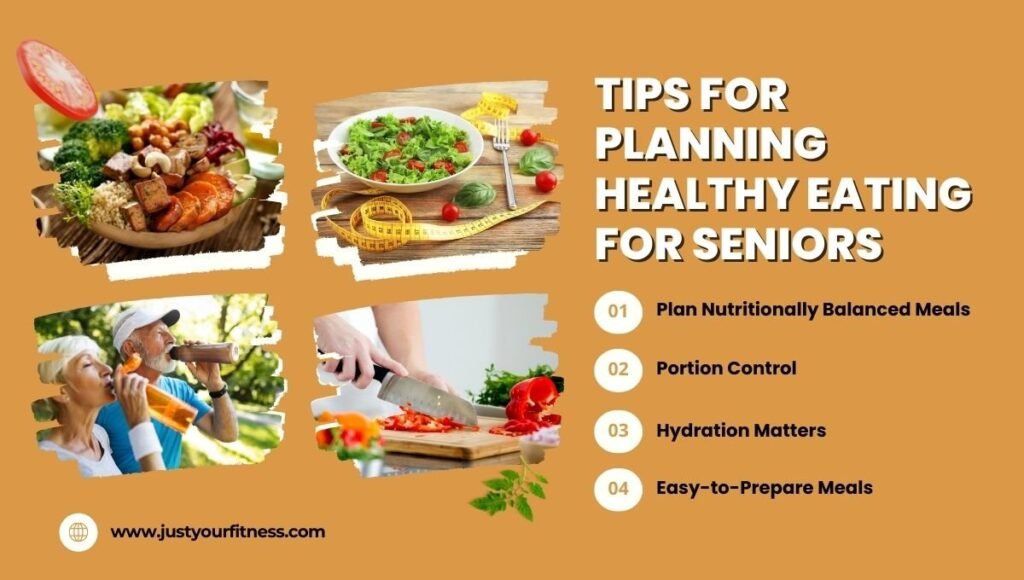Healthy Eating for Seniors: Simple Tips for Nutritious Meals
Introduction
Eating well is the core of good health at any age. Healthy eating for seniors is essential for maintaining overall health. It boosts energy. Also, it helps in controlling chronic diseases. Here’s an article with practical tips to help you enjoy healthy meals. Also, find out how to make meal times enjoyable and beneficial.
Understanding Healthy Eating for Seniors

Healthy food for elders depends upon eating well-balanced meals. They should choose meals that cater to their age requirements. Older people need more nutrients but require fewer calories than young ones. Proper mineral, vitamin, and fibre intake is necessary because it helps maintain good immunity. Also, a healthy diet manages chronic diseases such as diabetes or hypertension.
Why is Healthy Eating for Seniors Important?
Healthy eating in seniors prevents many diseases that occur with age. Nutrition enables an individual to maintain a healthy weight, develop healthy bones, keep the immune system strong, optimize mental skills, and maintain energy levels.
Essential Nutrients for Healthy Eating for Seniors

- Protein: Protein is required for muscle repair and maintenance. Your diet must include lean meats and fish. Also, include eggs and beans in your meal.
- Calcium and Vitamin D: These are very important for bones. The most common sources are dairy products and fortified cereals. Leafy greens, sunlight, and fortified foods are also good sources.
- Fiber: Fiber is essential for digestion. It helps stop constipation. Its sources are whole grains and fruits. Vegetables are also excellent sources of fibre.
- Antioxidants: Fruits and vegetables contain antioxidants. They fight inflammation and protect people from further disease.
Including Nutrients in Meal
Include nutrients in meal planning for seniors. You must apply these nutrients in each of the three meals. For a balanced breakfast, one wants to have eggs and whole-grain toast. A comforting vegetable soup with beans may be suggested at lunchtime. Furthermore, the dinner should contain lean protein combined with steamed vegetables.
Tips for Planning Healthy Eating for Seniors

Plan Nutritionally Balanced Meals
Meal planning should be the starting point for wholesome elderly nutrition. It would be best to target food variety, essential to meeting all nutrition requirements. Moreover, each meal must include a combination of proteins, vegetables, fruits, and whole cereals. Such variation also ensures a broad range of necessary nutrients.
Portion Control
As we age, calorie needs decline, but the body’s nutrient requirements stay upgraded. Portion control keeps a healthy body weight and ensures more nutrient-rich foods can be included in each meal. Additionally, create a small plate. Fill half of it with vegetables, one-quarter with lean protein, and one-quarter with whole grains.
Hydration Matters
Hydration is one of the most essential elements of healthy eating for seniors. It often decreases further in old age. It means older people intake only a little water. One should have at least eight glasses a day and must try to aim. Herbal teas also have a good role in this. Moreover, fruits and vegetables with high water content contribute as well.
Easy-to-Prepare Meals
Simplicity is key to eating healthfully. A simple meal is best for seniors, so choose simple meals. They only require a little fancy cooking or recipes. Salads, stir-fries, and sheet-pan dinners are healthy and require minimal preparation. Use pre-chopped vegetables and frozen fruits. These can save time and energy.
Special Concerns in Healthy Eating for Seniors

Addressing Special Diets
Some patients have particular nutritional needs due to certain diseases affecting their bodies, including diabetes and heart problems. Focus on the dietary practices of your elders. For example, diabetic patients should consider the carbohydrate content of their food. Persons suffering from heart problems should avoid foods rich in saturated fat.
Overcoming Changes in Taste
As we age, our taste buds change, affecting our food enjoyment. Healthy eating for seniors is about making food flavourful. This does not rely on extra salt or sugar. Use herbs and spices to add flavour. Fresh garlic, basil, and turmeric add flavour. Moreover, these have additional health benefits.
Dental Problems
Dental problems can make eating some foods difficult. So, the focus for seniors must be on softer foods. These do not hurt to chew. Yogurt and mashed potatoes are softer foods. Cooked vegetables are also easy on the teeth. Also, these are nutritious foods. So, it would be best if you chose these.
Enabling Social Meals
Eating with others can make mealtime much more pleasant. Social meals improve your mood and help you eat better. Share meals with family or friends or participate in community dining programs when possible.
Healthy Eating For Seniors: Breakfast Ideas

Start your day with a nutritious breakfast. Take oatmeal with fresh berries, scrambled eggs with spinach, or yogurt with fruit blended in a smoothie. These meals are full of good nutrients and very easy to prepare.
Lunch Options
Lunch can be a vegetable-based soup. Some hardy vegetables can be included. A salad with grilled chicken or a whole wheat wrap with vegetables and hummus would be good enough. Such dishes are filling and satisfying. They are also suitable for a healthy dosage of proteins, fibre, and vitamins.
Dinner Dishes for healthy eating for seniors
Dinner may include baked salmon with quinoa and steamed broccoli. Broccoli is a vegetable stir-fry with tofu. These meals provide a good balance of nutrition and are easy to digest.
Snack Ideas
Snacks need not be unhealthy. They can be both healthy and tasty. Healthy snack examples include nuts, fruits, and yogurt. Whole-grain crackers with cheese also make this list. These crackers contain extra nutrients, which facilitate energy support throughout the day.
Maintaining Routine Healthy Eating For Seniors

Regular Meals and Snacks
One must establish a regular eating pattern to maintain healthy eating for seniors. This pattern entails three healthy meals and two snacks per day. In this way, the nutritionist supports energy levels without overeating.
Batch Cooking
Cooking in bulk can ease meal preparations. Prepare large quantities of soups and stews. Furthermore, prepare casseroles and freeze portions. This way, one can have healthy meals at one’s convenience anytime.
Professional Advice
Seeking advice from a nutritionist can be helpful. It gives seniors the best ways to eat healthily. A professional can even help a person create a personalized meal plan. They can make a plan that fits individual health needs. Moreover, the plan focuses on a person’s preferences.
Enjoy the Process
Pleasant meals help create a positive, healthy eating experience for seniors. Try new recipes, add a variety of fruits and vegetables to your diet, and involve others in preparing meals.
Conclusion
Healthy eating for seniors is much more than meeting basic dietary guidelines. The concept is to build satisfying meals that are nutritious enough to support overall health. Seniors can stay healthy and energetic by learning about nutritional needs. Moreover, planning healthy meals and addressing unique reviews are also essential.
Follow the above tips and include healthy eating in your daily life. Your diet should promote good health and enrich the quality of your life.
FAQ’s
What are the essential nutrients in healthy eating for seniors we need to focus on?
Seniors should prioritize protein, calcium, Vitamin D, fiber, and antioxidants. These support bone health, digestion, and overall vitality.
How can seniors manage their calorie intake even?
Portion control is essential. Therefore, focus on nutrient-dense foods and smaller portions to maintain a balanced diet and manage weight.
What are good snack options for seniors?
Healthy snacks include fresh fruit, yogurt, nuts, and wholegrain crackers. They provide essential nutrients and keep energy levels stable throughout the day.








One Comment